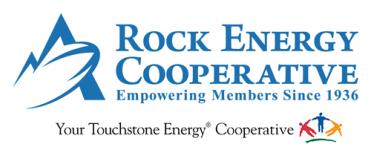Capital credits represent a substantial portion of the cooperative’s total equity. Capital credits are one of the many benefits of co-op membership. As a cost-of-service energy provider, Rock Energy doesn’t earn profits. Instead, co-ops use the term margins, which is any remaining balance at the end of the year after all bills are paid. Capital credits reflect each member’s proportional contribution to the cooperative’s equity. This differs from dividends that investor-owned utilities pay shareholders, who may or may not receive service from the utility. All capital credits allocated to the membership are retained (owned) by the cooperative until the board of directors elects to retire (pay out) a portion of capital credits.
Co-ops set rates to generate enough money to pay operating costs, make payments on any loans, and provide an emergency reserve. At the end of each year, we subtract operating expenses from the operating revenue collected during the year. The balance is called an operating margin.
An allocation is your proportional share of the margins. Allocated funds do not sit in a separate account. These funds are invested in the cooperative. Allocated funds remain the cooperative's funds until they are retired. Only when the board decides to retire capital credits do they become available to the member. A retirement is the amount you receive as a credit on your statement, or as a check (if you are a former co-op member). It is a percentage of your allocations. Typically, after utilizing capital for 20 to 30 years, it is retired.
Your contribution towards the co-op’s equity helps reduce the need for us to raise rates or borrow additional money to meet expenses. Co-ops receive their operating funds from two sources: the amount members pay for service and bank loans. Lenders require that co-ops maintain a minimum equity level, which is where capital credits come into play. Equity levels are a measure of financial strength. Higher levels give lenders more confidence that a loan can be repaid and allow them to offer competitive interest rates. Without this equity, members’ rates would be much higher.
Each year, your board of directors decides whether to retire capital credits based on the co-op’s financial health. Rock Energy’s ability to retire capital credits reflects the cooperative’s strength and financial stability.
Your capital credits remain on our books until they are retired. That’s why it’s important to let us know of any address changes. This year we issued checks totaling nearly $300,000 to past members.
The cooperative retains ownership of all equity, including allocated capital credits, until the board of directors elects to retire a portion of the equity. Co-ops, in part, use the capital credits system to ensure fairness across generations. The equity generated from past members help keep our rates affordable for today’s members.
The balance of an individual former member may be small compared to the co-op’s total operating budget, but we have thousands of former members. If every former member asked for and received all their equity today, Rock Energy’s costs would increase, thus impacting rates.
A deceased member’s capital credits may be paid at a discount without waiting for a general retirement. A representative of the estate must contact us.
We do everything we can to ensure that former members get their retired capital credits. Each fall we publish a list of unclaimed capital credits. Any money that isn’t claimed is placed in the Federated Youth Foundation and used for educational purposes, including scholarships and youth programs in both Wisconsin and Illinois, or is retained as permanent equity for the cooperative.
